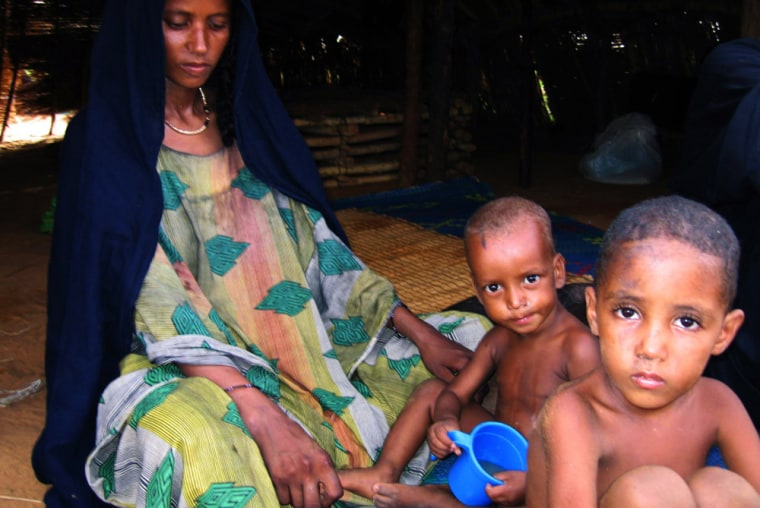Weeks of treatment in a remote Malian hospital have saved tiny 26-month-old Tideye Alminawi’s life, but she’s showing signs of the long-term damage hunger wreaks on tender bodies and minds.
What appears to be a permanent gaping grin may be a sign of mental retardation, explains Dr. Yacouba Cissoko, acting head of pediatrics at the ramshackle hospital in the town of Gao, 745 miles east of the capital, Bamako. Three severely malnourished babies have died here in recent weeks.
Tideye constantly arches her back and nods her head compulsively.
“You can see she has mental problems, the way she holds herself. She’s spastic because of her malnutrition,” said Cissoko as he tests the girl’s responses.
“All the babies you see here now will have problems later, that’s certain,” Cissoko said after making the rounds of nearly two dozen skeletal babies watched over by anxious mothers. “Most of the people you know who seem very intelligent were likely well fed as children and haven’t suffered from malnutrition.
“Malnutrition affects peoples’ long-term health, which hurts their productivity, undermines social structures and keeps the country from developing.”
Mali, one of the world’s poorest countries, usually has trouble ensuring all its people are fed. Hunger is worse than ever this year in Mali and across chronically dry West Africa because of a locust invasion last year, followed by drought.
Niger, Burkina Faso and Mauritania also are affected. An estimated 1.5 million of Mali’s 11 million people are said to be facing hunger, including an estimated 144,000 children suffering malnutrition.
“The problem of malnutrition is chronic here, but this is a particularly grave moment,” Cissoko said.
Fighting the endemic
The French aid agency Action Contre la Faim — Action Against Hunger — set up a treatment center for malnourished children at Gao hospital last month, joining local medical workers in responding to the food crisis.
Dr. Clara Marti Mashooka of Action Against Hunger examined a new arrival, 9-month-old Djibril Allasane, twisting his loose folds of skin to see if they rebound as a healthy child’s should. They don’t, because Djibril is extremely dehydrated. He hasn’t had the strength to nurse for days. He may be physically stunted for life.
“If he didn’t come in now, he would have been dead in hours,” Mashooka said of her newest charge. “He wouldn’t have lasted the night.”
Djibril was expected to respond well to an emergency treatment of enriched milk and medicine.
“In days, you’ll see a big change. He’ll start drinking milk and he’ll be laughing. It’s very rapid and fulfilling,” said Mashooka. “But what kind of life will he have later?”
Cissoko, the pediatrics chief, said the solution to chronic malnutrition across West Africa is education first, then economic development.
Children at greatest risk are those recently weaned from mothers who aren’t sure what kinds of solid foods to give to their babies, particularly in times like these when creating a balanced diet is even more difficult.
Tideye’s mother, Safi Nihidy, said the future of children is not in human hands.
“If God wants them to be better, they will be,” she said. “If God wants to give them health and a good life, that’s in his hands.”
